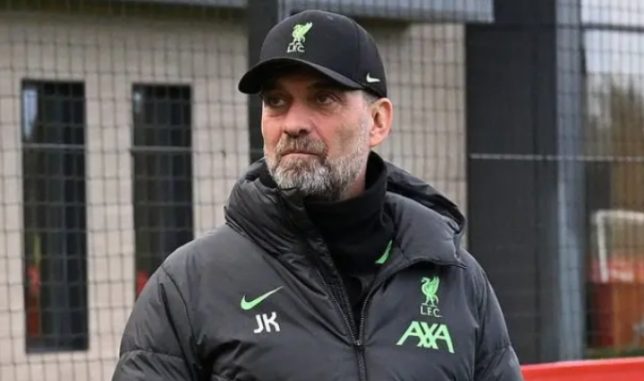
Liverpool Boss Jürgen Klopp’s reaction says everything about VAR but everyone needs to stop crying conspiracy

Liverpool manager Jürgen Klopp is right about VAR. Changes need to be made but getting rid won’t help. Can the rest of the league join a sensible conversation?
Liverpool manager Jürgen Klopp was asked about VAR during his pre-Newcastle press conference.
Liverpool manager Jürgen Klopp was asked about VAR during his pre-Newcastle press conference.
Liverpool beat Burnley and moved top of the Premier League despite two potentially controversial refereeing decisions on Boxing Day. With contentious calls in the matches involving Manchester City and Arsenal since — two other Premier League title contenders — VAR, the PGMOL and refereeing are back under the spotlight. It’s never away for long.
Asked during his pre-Newcastle United press conference if the authorities had to be ‘brave’ about VAR — in the reporter who asked the question’s words, because it ‘doesn’t appear to be improving’ — Jürgen Klopp was reluctant to commit one way or another, in order to avoid making headlines. But the German did offer one or two opinions.
“I really don’t think I should answer this question — I give you too often the opportunity to use my phrases,” Klopp replied. “We can talk on and on and on but we know if already. The authorities probably know it already. What do you mean they have to be brave?”
“Abandon it,” the reporter answered. “Oh my God, take VAR away?” Klopp said, his reaction saying everything you need to know. “No. Use VAR better. That is probably the right thing and I think it could be done.”
That strikes at the heart of the issue and what should come next. Getting rid of a system that is there to avoid errors is not the way to get better, but neither is using the technology in exactly the way that it is being used right now. There is a middle ground.
The first thing that needs to change is the wording of some of the rules, which is actually nothing to do with VAR at all. For all that Paul Tierney was criticized in the wake of Harvey Elliott’s disallowed goal against Burnley, by the letter of the law, he was correct in ruling it out (the other disallowed goal for Cody Gakpo should have been far more controversial).
A simple change in how the rules are worded — if a player (in this case Mohamed Salah) is pushed into an offside position, even if it is not enough for a foul to be awarded on the attacker, then that comes into consideration — would have stopped the Elliott goal from being chalked off. That feels like an easy enough conclusion to come to, instead of endless debate about whether a decision was right, wrong, or lacking common sense.
When VAR was first brought in, there was a school of thought that worried we would no longer have enough talking points because major refereeing errors would be prevented. Instead, we talk about things just as much, just with a different framing and a lack of tolerance for officials because they now have a second chance to get something right.
Sign up for our EXCLUSIVE Liverpool.com newsletter!
Liverpool manager Jürgen Klopp.
If you enjoyed this piece, you’ll love our Liverpool.com newsletter — once a week, we send exclusive, bonus content only to people signed up to our mailing list!
Our newsletter subscribers get an extra slice of Liverpool.com from one of the best Liverpool FC writers around — straight to your inbox, and completely for free.
Wherever you are in the world — in the US, the UK or further afield — you don’t want to miss out.
Oftentimes, though, decisions are subjective. Almost every decision can be argued either way to some extent because the laws of the game simply cannot cover every outcome. Quite often, a scenario arises that you have never seen before.
While Willy Boly’s second yellow for Nottingham Forest a week or two ago was incorrect, you can see what the referee, Rob Jones, thought he saw with the contact on the follow-through. Another simple VAR change that would have stopped that error would be to allow a review of offenses like that which lead to second yellow cards. That is, in fairness, under consideration for the future.
Referees do not want to remove the technology but the way that it is used can be refined. Klopp — and probably other managers around the Premier League — would surely welcome that. But something else has to change as well; not only with the officials and the laws of the game. Soccer is now so tribal that nothing, in some quarters, can ever just be seen as a mistake.
At grounds around the Premier League, the word ‘corrupt’ is suddenly in vogue. It is not corrupt that Everton, after admitting wrongdoing, was handed a points penalty small enough not to matter in terms of relegation for the first time in three seasons.
Nor is it ‘corrupt’ that one penalty was correctly ruled out and another correctly awarded in a match between Crystal Palace and Liverpool, to give just one recent example where the C-word was thrown about by the home fans in Selhurst Park to protest decisions that were ultimately right. Jordan Ayew’s red card should have led to criticism for a player who took a stupid risk, but instead saw referee Andy Madley come under fire.
A constructive conversation about VAR is useful — vital, in fact. Changes are required in terms of how the technology is applied and used but we still need it precisely because referees are not, and never will be, perfect. Klopp’s reaction during his press conference summed that up nicely, but until the wider climate around the Premier League is calm, sensible and ready enough for that topic to be broached, it might not matter.
Leave a Reply